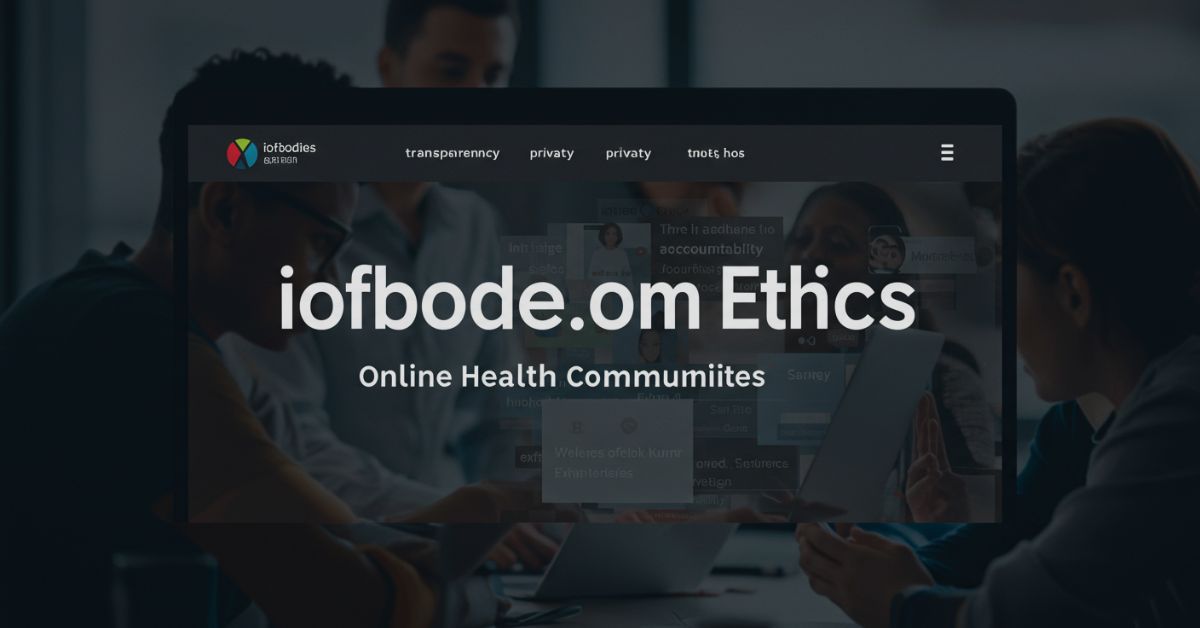Contents
- 1 Introduction to Online Health Communities
- 2 The Ethical Dilemma of iofbodies.com
- 3 The Impact of Social Media on Body Image and Health
- 4 Ethical Guidelines for Moderators and Participants
- 5 Addressing Cyberbullying and Online Harassment in Health Communities
- 6 Protecting Vulnerable Members in Online Health Communities
- 7 Promoting a Positive and Ethical Culture in Online Health Communities
- 8 Conclusion:
Introduction to Online Health Communities
The digital age has transformed the way we connect, share, and seek support for our health. Online health communities have emerged as vital spaces where individuals come together to discuss everything from chronic illnesses to mental well-being. These platforms offer invaluable resources and a sense of belonging that many users crave. However, with this connectivity comes a host of ethical challenges that can complicate these interactions.
One platform at the center of such discussions is iofbodies.com, which aims to create an inclusive space for people navigating body image issues. While these communities provide comfort and understanding, they also raise important questions about ethics in online engagement. How do moderators maintain balance? What responsibilities do participants hold? As we explore these dimensions, it becomes clear that fostering a healthy dialogue is not just beneficial—it’s essential for the well-being of all involved. Let’s dive deeper into the ethical landscape surrounding online health communities like iofbodies.com and uncover ways to navigate them thoughtfully.
The Ethical Dilemma of iofbodies.com
iofbodies.com has emerged as a significant platform for individuals grappling with body image issues. However, its very existence raises ethical questions. Users seek support and understanding, yet the potential for harmful content lurks in every thread.
The site can foster both positive connections and toxic interactions. Members might share personal stories that inspire resilience or inadvertently promote unrealistic beauty standards. This duality creates a gray area where ethics come into play.
Moderators face challenges in balancing freedom of expression with safeguarding mental health. They must decide what constitutes supportive dialogue versus harmful rhetoric.
Participants also navigate their own responsibilities within this digital space. Sharing experiences is vital, but so is maintaining respect and compassion for others’ journeys.
As iofbodies.com continues to grow, these ethical dilemmas demand careful reflection and proactive strategies to ensure it remains a safe haven rather than a breeding ground for negativity.
The Impact of Social Media on Body Image and Health
Social media has revolutionized the way we perceive ourselves and others. With a constant stream of images, influencers, and trends, it can be hard to escape the comparison trap.
Platforms like Instagram and TikTok often showcase curated lifestyles that may distort reality. This exposure can lead to unrealistic beauty standards for many users.
Young individuals are particularly vulnerable. They absorb messages about body image daily. The pressure to conform can foster feelings of inadequacy or low self-esteem.
Conversely, social media also has the power to uplift. It provides communities where people share their journeys toward self-acceptance. Positive representation matters, offering a more inclusive view of health and beauty.
Navigating this landscape requires awareness from both users and platforms alike on responsibility in shaping perceptions around body image.
Ethical Guidelines for Moderators and Participants
Establishing ethical guidelines is crucial for maintaining a healthy environment in online health communities. Moderators play a key role in setting the tone and enforcing these standards.
They should prioritize transparency by clearly communicating community rules. This fosters trust among participants, encouraging open discussions.
Participants also share responsibility. They need to engage respectfully and thoughtfully while acknowledging diverse perspectives. Compassionate dialogue can lead to better understanding and support.
It’s essential that moderators actively monitor conversations for any harmful content or misinformation. Quick action against violations helps maintain the integrity of the space.
Regularly reviewing guidelines ensures they remain relevant as new challenges arise. Community input on these policies can empower members, making them feel invested in their shared space.
Emphasizing empathy while interacting promotes connection rather than division, nurturing a supportive atmosphere beneficial for all involved.
Addressing Cyberbullying and Online Harassment in Health Communities
Cyberbullying and online harassment present serious challenges in health communities. The anonymity of the internet can unfortunately encourage negative behavior.
Members often share personal struggles, making them vulnerable. This vulnerability can attract harmful comments or aggressive actions from others. Such experiences not only affect mental well-being but also deter individuals from seeking support.
To combat this issue, it’s essential for community moderators to establish clear guidelines against bullying. Having a straightforward reporting system empowers members to speak out without fear of retribution.
Encouraging open dialogues about respect and kindness can foster a safer environment. Community workshops or forums that focus on empathy might be beneficial as well.
Promoting positive reinforcement among members helps create camaraderie rather than division. Supportive interactions should always take precedence over negativity within these spaces.
Protecting Vulnerable Members in Online Health Communities
Online health communities often attract individuals who are vulnerable due to personal circumstances. These members may be dealing with chronic illnesses, mental health issues, or body image concerns. It’s crucial to create an environment that prioritizes their safety and well-being.
Establishing clear guidelines can help protect these individuals. Moderators should ensure discussions remain respectful and supportive. This approach fosters a sense of belonging while minimizing the risk of harmful interactions.
Encouraging community members to share resources about mental health support can also make a difference. Connecting vulnerable members with professional help when needed is vital.
Furthermore, implementing reporting mechanisms allows users to flag inappropriate content or behavior easily. Swift action from moderators reassures participants that their voices matter in maintaining a healthy space for everyone involved.
Promoting a Positive and Ethical Culture in Online Health Communities
Creating a positive and ethical culture in online health communities starts with clear communication. Encouraging open dialogue fosters trust among members. Transparency about community guidelines is essential.
Moderators play a crucial role in setting the tone. They should model respectful behavior, addressing any negativity swiftly. This helps maintain a supportive atmosphere where everyone feels safe to share their experiences.
Empowering users to contribute positively can also make a difference. Encourage members to celebrate achievements and offer constructive feedback rather than criticism.
Education is vital too. Providing resources on mental health, body positivity, and self-care can help shape discussions towards healthier perspectives.
Recognizing diverse voices enriches the community experience. Inclusivity ensures that various viewpoints are represented, making everyone feel valued and heard within these spaces.
Conclusion:
Navigating the complex landscape of online health communities is essential for fostering a safe and supportive environment. iofbodies.com serves as a prime example of how ethical dilemmas can arise in digital spaces focused on health and wellness. The interplay between social media, body image, and mental well-being often complicates discussions within such forums.
Promoting ethical guidelines helps ensure that both moderators and participants engage positively. By addressing cyberbullying and harassment actively, these communities can protect their most vulnerable members while encouraging constructive dialogue.
As we move forward in this digital age, creating a culture that emphasizes respect, empathy, and support will be crucial. Online health communities have the potential to make meaningful impacts on individuals’ lives when grounded in strong ethical practices. A commitment to nurturing positive interactions benefits everyone involved—making each member feel valued and understood.
Ethan Cole is a versatile writer at hsnime.co.uk, offering fresh perspectives and engaging content across various topics. With a passion for creativity and knowledge, Ethan aims to provide insightful articles that resonate with a diverse audience.










